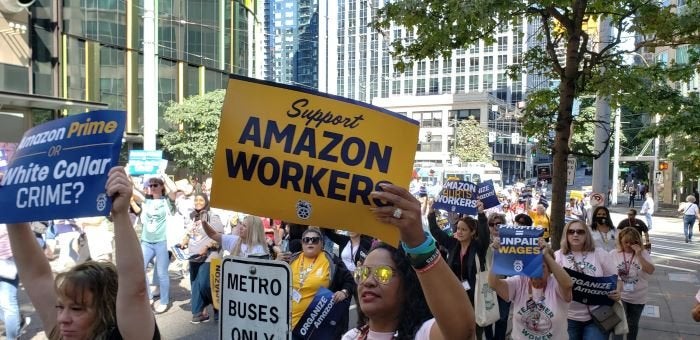Press Releases
Teamsters, Labor Coalition Secure New San Francisco Regulations for Warehouse Development

Policy Ensures Companies Like Amazon Must Meet Community Standards
Press Contact: Kara Deniz Email: kdeniz@teamster.org
(SAN FRANCISCO) – Teamsters, along with a coalition of local building trades, the Sierra Club, San Francisco Labor Council, and community groups, have secured a landmark policy requiring public review of any new warehouse proposal by e-commerce companies like Amazon in San Francisco.
The first-of-its-kind policy is the most significant action taken by a U.S. city to address the rapid expansion of warehouses and last-mile delivery operations that have a direct and significant impact on jobs, air pollution, and traffic.
“San Francisco is a union town, and along with our coalition partners and the elected officials that stood with us, the leaders of Teamsters local unions in San Francisco led the way in passing this landmark legislation,” said Peter Finn, President of Teamsters Joint Council 7. “Their work will make a real difference in ensuring companies like Amazon can’t profit from exploiting workers and our local communities.”
“This policy allows for working people, community members, and local officials to come together and decide what they want to see in their own backyard,” said Phil Javier, a UPS driver and Vice President of Teamsters Local 2785. “It puts the autonomy back into the hands of the people and out of the hands of major corporations, allowing us to set the standards. We now have the ability to make sure that any new warehouses that want to come into our city meet environmental standards, provide good-paying jobs, and have a positive impact on the community.”
Companies looking to build warehouses will now be required to receive a new permit before moving forward with development in San Francisco. The process will allow for public input and officials to study the potential impact of a new warehouse on the public’s health, safety, and general welfare. Public officials can then, based on their analysis, determine if the company is meeting meaningful standards before permitting development to move forward.
The policy replaces a moratorium put in place in 2022, which temporarily prevented development of new parcel delivery services in the city. Teamsters and the local labor coalition played a crucial role in implementing the moratorium and shaping the new policy, which lays the foundation for other cities looking to have a say in how these e-commerce companies operate in their communities.
“The massive explosion of warehouse operations in California has resulted in dangerous pollution for communities and workers, many of whom are already disproportionately burdened by bad air and health problems,” said Jacob Klein, Organizing Manager with the Sierra Club San Francisco Bay Chapter. “This ordinance will ensure local industrial warehouse developers can no longer pollute with impunity and that proposed warehouses in San Francisco will be reviewed under the California Environmental Quality Act.”
Amazon has ramped up its development of warehouses in the past decade. In California, Amazon warehouses grew from just 13 in 2014 to 198 today, and warehouses grew from 91 to 1,435 nationally during this same period. In addition to environmental and traffic concerns, studies have shown that warehouse workers in areas where Amazon is present make 30 percent less than that area’s monthly average, demonstrating the negative impact these facilities have on workers’ wages.
“San Francisco’s building and construction trades workers know better than anyone the work that goes into creating massive warehouses, and we want to ensure that the projects we work on have support from local residents,” said Rudy Gonzalez, Secretary-Treasurer of the San Francisco Building and Construction Trades Council. “If our coalition of labor allies can accomplish this in San Francisco, we know other cities can do the same to ensure companies like Amazon don’t push the construction of new warehouses without support from the community and without an understanding of the environmental impact.”
Through this new policy, San Francisco will encourage development that provides substantial net benefits for communities and minimize possible harmful effects by ensuring that all commercial and industrial uses meet the city’s standards and provide quality employment opportunities for workers.